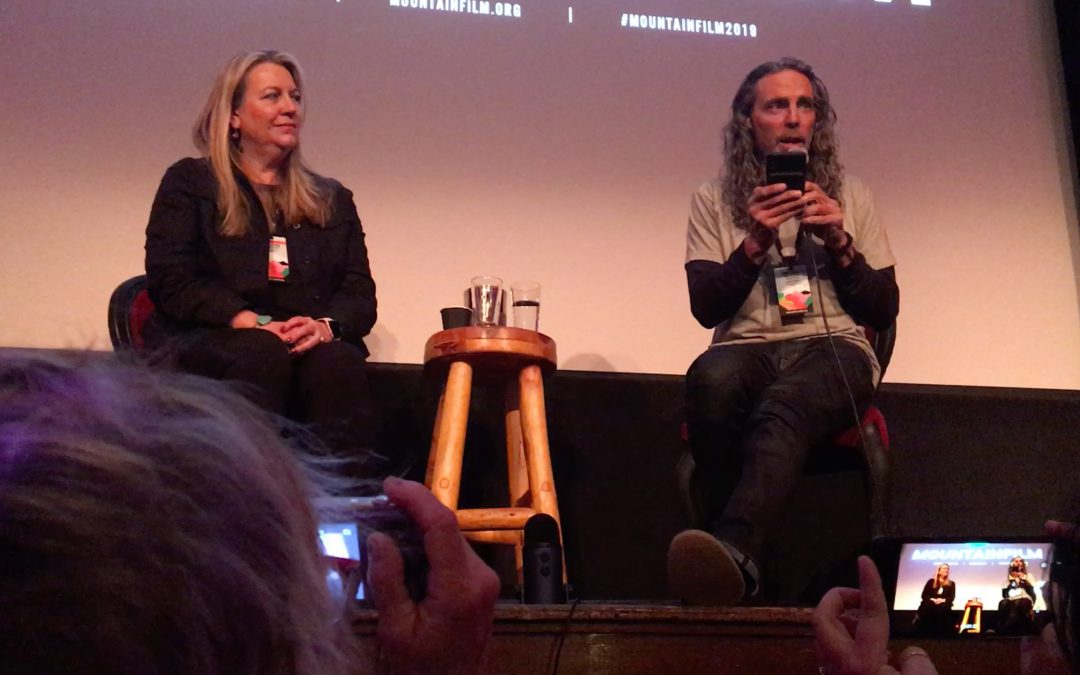Following a perspective-changing and soul-searching weekend at the 2019 Mountainfilm Festival in Telluride, CO, many of us festival-goers were left with a disorienting sensation. The events of the past few days had certainly been influential, but they would shortly become nothing more than memories of an incredible weekend. While this was a welcome relief for the sleep-deprived, it also left a note of bittersweet uncertainty: would anything we learned here come with us into our regular lives?
Author Cheryl Strayed and director Tom Shadyac sought to address this very question in their talk titled, What Now?, held at 8am on Monday, May 27th, the last day of the festival. Those of us that attended were completely motivated and all in to the discussion––we had to be in order to be in line by 6:45 am for a queue card. As the festival-goers filed into the Sheridan Opera House, the room began to buzz with anticipation for the two hosts until, finally, they walked onstage.
Cheryl Strayed is perhaps best known for her work as an author––her memoir, Wild, was adapted into a 2014 film with Reese Witherspoon starring as Strayed. This year, she served as guest director for the Mountainfilm Festival. Throughout the talk, she was consistently classy and deep-thinking.
Tom Shadyac is a director best known for works such as Ace Ventura: Pet Detective and Bruce Almighty. In 2010, Shadyac’s documentary I Am won Mountainfilm’s Audience Award as well as the Student Choice Award. Shadyac maintained a predictably comic persona throughout the discussion but was as equally deep-thinking as Strayed.
Strayed and Shadyac began the talk with a quick clarification: this was not to be the sort of presentation where they talked at us but rather where they held a discussion with us. Because of this, audience members were encouraged to raise their hands and contribute their thoughts about Mountainfilm 2019. What followed was a group-wide stream of consciousness with much emotion and self-reflection on the experience.
One of the first topics that came up was the idea of being more peaceful people. Strayed recounted the story of the time she cut someone off in traffic and the driver predictably let out a sling of profanity and zoomed ahead of her, only to come to a stop right next to Strayed at the next stop light. Strayed, while admitting that she normally flips the bird in situations like these, had kids sitting in the back seat and wanted to be a good role model, so she rolled down her window and told the driver how sorry she was that she cut him off and to have a nice day. She recounted how the man was completely shocked and apologized profusely for his language. They both left the stoplight feeling lighter. Strayed explained that the message of the story was to lay down your arms––it’s not necessary to act on your emotions all the time and often, deescalating the situation produces a better outcome than engaging in a fight.
Strayed and Shadyac made a good team––after one explained an idea, the other would springboard off of it and expand on it. Always, they returned to the audience and allowed them to dictate where the conversation went.
One audience member asked how to maintain hope in a seemingly hopeless world, especially in regard to climate change. After some discussion, the hosts concurred that while you cannot control the world around you, you are always in control of your own actions. Therefore, they told us, “do not sit in the overwhelm” and “don’t relinquish your power.” As Strayless would mention later in the discussion, it’s best to focus on the here and now because if you think about what you’re really going to have to do, you’ll likely psych yourself out and be unable to do it. In essence, you are more capable than you realize.
Shadyac brought up that he disliked the term “woke;” he thought that the term really should be “waking” to reflect the work-in-process that everyone is. He explained that “woke” gives the idea that someone’s figured it all out, when really, no one ever has it all figured out.
Equity, being the official theme of Mountainfilm 2019, was a much-discussed topic. While audience members reflected on their own personal struggles with equity, Shadyac noted that “we don’t see things as they are; we see them as we are.” This idea seemed especially relevant in the packed opera house as tens of people wrestled with their own thoughts in relation to the world.
As hard as some of the discussions were, everyone seemed incredibly grateful to be present in the room that morning. There was this great feeling of equanimity amongst all who attended. As one audience member noted at the very end of the discussion, there was no feeling of ownership for this individual talk and Mountainfilm as a whole––rather, it all existed because of collaboration. Everyone who was present were there because of others’ assistance and so there was this great “chain of thanks” that connected everyone in the room and beyond. While the idea could be construed as hippy-ish and sappy, in the moment, it felt exactly right. We had all been part of a great event that none of us had any ownership over. It was a great feeling.


Recent Comments